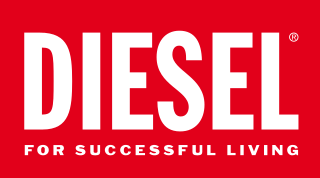Related Research Articles

Diesel S.p.A. is an Italian retail clothing company, located in Breganze, Italy. It sells denim and other clothing, footwear, and accessories. The clothing line has two different brands: Diesel and Diesel Black Gold. There is also a line for children, called Diesel Kid. The company is known for its surreal advertising campaigns.

The Columbia Sportswear Company is an American company that manufactures and distributes outerwear, sportswear, and footwear, as well as headgear, camping equipment, ski apparel, and outerwear accessories.
Bugle Boy Industries, Inc. was a clothing company founded by William Mow in 1977. It is perhaps best known for its namesake brand of denim jeans that were popular in the 1980s. The company declared bankruptcy in 2001.

Anne Elisabeth Jane Claiborne was an American fashion designer and businesswoman. Her success was built upon stylish yet affordable apparel for career women featuring colorfully tailored separates that could be mixed and matched. Claiborne is best known for co-founding Liz Claiborne Inc., which in 1986 became the first company founded by a woman to make the Fortune 500 list. Claiborne was the first woman to become chair and CEO of a Fortune 500 company.
Streetwear is a style of casual clothing which became global in the 1990s. It grew from New York hip hop fashion and Californian surf culture to encompass elements of sportswear, punk, skateboarding and Japanese street fashion. Eventually haute couture became an influence. It commonly centers on "casual, comfortable pieces such as jeans, T-shirts, baseball caps, and sneakers", and exclusivity through intentional product scarcity. Enthusiasts follow particular brands and try to obtain limited edition releases.

VF Corporation is an American global apparel and footwear company founded in 1899 by John Barbey and headquartered in Denver, Colorado. The company's 13 brands are organized into three categories: Outdoor, Active and Work. The company controls 55% of the U.S. backpack market with the JanSport, Eastpak, Timberland, and The North Face brands.

Joop GmbH, branded JOOP!, is a German luxury fashion house specializing in contemporary clothing and cosmetics.

Admiral is an English sportswear brand, with a manufacturing emphasis on clothing for association football. Founded in 1914 in Leicester, Admiral is one of the oldest sports brands in the UK and was originally an undergarment brand but switched to the manufacture of apparel for sports that have included cricket, cycling and athletics, as well as football. The Admiral logo was formally registered with the trademark office on 6 September 1922. The company reached the peak of its success in the 1970s, 1980s and early 1990s through a series of football team sponsorships.

G-Star RAW is a Dutch designer clothing company, founded by Jos van Tilburg in Amsterdam in 1989. The brand specializes in making raw denim—an unwashed, untreated denim. G-Star is influenced by military clothing. Inspirations of their designs come from vintage military apparel from around the world.

Calvin Klein Inc. is an internationally operating, American fashion house. The company, which became famous for its designer underwear and denim lines in the 1980s, specializes in mass-market ready-to-wear clothing for all genders and age groups as well as leather products, lifestyle accessories and shoes, home furnishings, perfume/cosmetics, eyewear, jewellery and watches in the mid-price segment. Its high-end runway fashion division, which represented the top level of the various Calvin Klein sub-brands, was discontinued in 2019.
The United States is the leading country in the fashion design industry, followed by France, Italy, the United Kingdom, Germany, and Japan. Apart from professional business attire, American fashion is eclectic and predominantly informal. While Americans' diverse cultural roots are reflected in their clothing, particularly those of recent immigrants, cowboy hats, boots, jeans, and leather motorcycle jackets are emblematic of specifically American styles.
B.U.M. Equipment, a clothing brand under the ownership of BUM Equipment LLC, is a street fashion clothing company that was founded in 1986 in a Seattle garage. The brand is known for its beginning as a Los Angeles casual sportswear brand for men, women, and children. The brand had financial troubles in the mid-1990s under the management of the original owner, Chauvin International, Ltd. It went bankrupt in 1996 and was acquired by the creditors of B.U.M. International Inc. and managed by SOS Management in 1997. SOS Management, and its successor B.U.M. Equipment LLC, subsequently relaunched B.U.M. Equipment. The brand's fashion lines include men's, women's, junior's, and children's sportswear apparel, as well as hosiery, footwear, backpacks, handbags, luggage, and eyewear. According to the LA Times, B.U.M. Equipment is "one of the most successful young men's sportswear brands in California fashion history."

Grunge fashion is the clothing, accessories and hairstyles of the grunge music genre and subculture which emerged in mid-1980s Seattle, and had reached wide popularity by the mid 90s. Grunge fashion is characterized by durable and timeless thrift-store clothing, often worn in a loose, androgynous manner to de-emphasize the silhouette. The style was popularized by music bands Nirvana, Soundgarden and Pearl Jam.

Sophie Leung Lau Yau-fun, OBE, GBS, JP is a resident of the Hong Kong SAR, Mrs. Sophie Leung had been a Member of the Legislative Council of HKSAR from 1996 to 2012, representing the textile and garment industry, and has been a Deputy of the National People's Congress of the People's Republic of China since 2003.
Tommy Hilfiger B.V., formerly known as Tommy Hilfiger Corporation and Tommy Hilfiger Inc., is an American clothing brand, manufacturing apparel, footwear, accessories, fragrances and home furnishings. The company was founded in 1985, and the brand's merchandise is sold in department stores and over 2000 free-standing retail stores in 100 countries. In 2006, private equity firm Apax Partners acquired the company for approximately $1.6 billion. In March 2010, PVH Corp. bought the company. Daniel Grieder was appointed CEO in July 2014, while founder Tommy Hilfiger remains the company’s principal designer, leading the design teams and overseeing the entire creative process. Global sales in retail through the brand were US $6.4 billion in 2013, and $6.7 billion in 2014.

Arvind Limited is a textile manufacturer and the flagship company of the Lalbhai Group. Its headquarters are in Naroda, Ahmedabad, Gujarat, India, and it has units at Santej. The company manufactures cotton shirting, denim, knits and bottomweight (khaki) fabrics. It has also recently ventured into technical textiles when it started Advanced Materials Division in 2011. It is India's largest denim manufacturer.

Athleisure is a hybrid style of athletic clothing typically worn as everyday wear. Athleisure outfits can include yoga pants, tights, sneakers, leggings and shorts that look like athletic wear, characterized as "fashionable, dressed-up sweats and exercise clothing". Since the 2010s, it has become more common to wear gym clothes outside the gym, whether the wearer is exercising or not.
Brittania Sportswear Ltd was a Wyomissing, PA-based clothing company best known for women's jeans in the 1970s and 1980s. It is not to be confused with Britannia Clothing Company, a United Kingdom clothing company.

The COVID-19 pandemic affects the global fashion industry as governments close down manufacturing plants, and through store closures, and event cancellations to slow the spread of the virus. The coronavirus pandemic has had a major impact on fashion brands worldwide. At the same time, the fashion industry faces challenges in consumer demand. New opportunities are also presenting themselves as fashion brands shift to making fashionable coronavirus face masks. The ongoing COVID-19 pandemic is inevitably changing the fashion world forever. Domenico de Sole, chairman of Tom Ford International, remarked that “I have seen a lot of difficult situations in my long career and this has been the most devastating event, not just for fashion and luxury, but all industries.”
References
- 1 2 3 Jacobs, Alexandra (February 11, 2015). "Critic's Notebook: A New Generation of Designers Chooses Anonymity". The New York Times . Retrieved December 4, 2020.
- 1 2 Frey, Christine (August 7, 2004). "Retail Notebook: Saltaire targets 25-55 demographic". Seattle Post-Intelligencer . Retrieved December 4, 2020– via seattlepi.com.
- ↑ "Merchandising and Strategy Changes: A glance at retailers that are restrategizing". The Seattle Times/NW Retail News. June 2003. Archived from the original on October 23, 2006. Retrieved December 4, 2020.
- ↑ LaMarca, William R. (March 8, 2007), Seattle Pacific Industries v. Golden Valley Realty Associates and Zelkin (PDF), Supreme Court of the State of New York (Nassau County)
- ↑ Holden, Stephen (September 21, 1986). "How the Curtain Came Down on the Dream of 'Rags'". The New York Times.